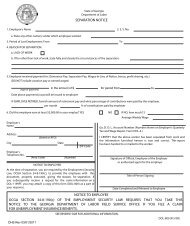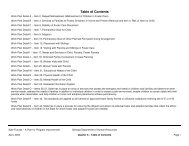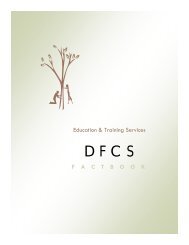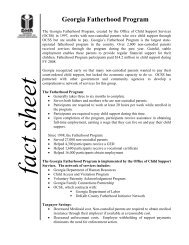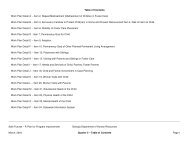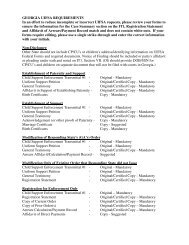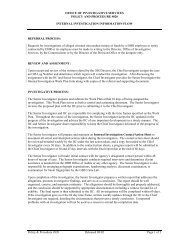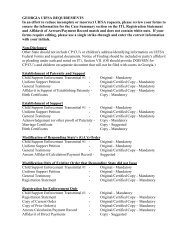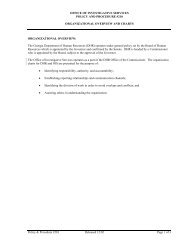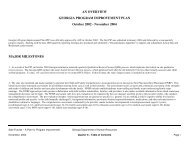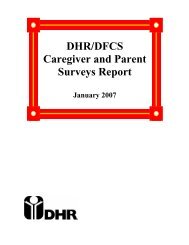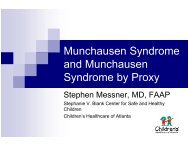- Page 1 and 2: Customer Contact Center Food Stamp/
- Page 3 and 4: Call Center FS/FM SUCCESS PG Octobe
- Page 5 and 6: Call Center FS/FM SUCCESS PG Octobe
- Page 7 and 8: Call Center FS/FM SUCCESS PG Octobe
- Page 9 and 10: Call Center FS/FM SUCCESS PG Octobe
- Page 11 and 12: Call Center FS/FM SUCCESS PG Octobe
- Page 13 and 14: Call Center FS/FM SUCCESS PG Octobe
- Page 15: Call Center FS/FM SUCCESS PG Octobe
- Page 19 and 20: Call Center FS/FM SUCCESS PG Octobe
- Page 21 and 22: Call Center FS/FM SUCCESS PG Octobe
- Page 23 and 24: Call Center FS/FM SUCCESS PG Octobe
- Page 25 and 26: Call Center FS/FM SUCCESS PG Octobe
- Page 27 and 28: Call Center FS/FM SUCCESS PG Octobe
- Page 29 and 30: Call Center FS/FM SUCCESS PG Octobe
- Page 31 and 32: Call Center FS/FM SUCCESS PG June 2
- Page 33 and 34: Call Center FS/FM SUCCESS PG Octobe
- Page 35 and 36: Call Center FS/FM SUCCESS PG Octobe
- Page 37 and 38: Call Center FS/FM SUCCESS PG Octobe
- Page 39 and 40: Call Center FS/FM SUCCESS PG Octobe
- Page 41 and 42: Call Center FS/FM SUCCESS PG Octobe
- Page 43 and 44: Call Center FS/FM SUCCESS PG Octobe
- Page 45 and 46: Call Center FS/FM SUCCESS PG Octobe
- Page 47 and 48: Call Center FS/FM SUCCESS PG Octobe
- Page 49 and 50: Call Center FS/FM SUCCESS PG Octobe
- Page 51 and 52: Call Center FS/FM SUCCESS PG Octobe
- Page 53 and 54: Call Center FS/FM SUCCESS PG Octobe
- Page 55 and 56: Call Center FS/FM SUCCESS PG Octobe
- Page 57 and 58: Call Center FS/FM SUCCESS PG Octobe
- Page 59 and 60: Call Center FS/FM SUCCESS PG Octobe
- Page 61 and 62: Call Center FS/FM SUCCESS PG Octobe
- Page 63 and 64: Call Center FS/FM SUCCESS PG Octobe
- Page 65 and 66: Call Center FS/FM SUCCESS PG Octobe
- Page 67 and 68:
Call Center FS/FM SUCCESS PG Octobe
- Page 69 and 70:
Call Center FS/FM SUCCESS PG Octobe
- Page 71 and 72:
Call Center FS/FM SUCCESS PG Octobe
- Page 73 and 74:
Call Center FS/FM SUCCESS PG Octobe
- Page 75 and 76:
Call Center FS/FM SUCCESS PG Octobe
- Page 77 and 78:
Call Center FS/FM SUCCESS PG Octobe
- Page 79 and 80:
Call Center FS/FM SUCCESS PG Octobe
- Page 81 and 82:
Call Center FS/FM SUCCESS PG Octobe
- Page 83 and 84:
Call Center FS & FM Phase II PG Feb
- Page 85 and 86:
Call Center FS & FM Phase II PG Feb
- Page 87 and 88:
Call Center FS & FM Phase II PG Feb
- Page 89 and 90:
Call Center FS & FM Phase II PG Feb
- Page 91 and 92:
Call Center FS & FM Phase II PG Feb
- Page 93 and 94:
Call Center FS & FM Phase II PG Feb
- Page 95 and 96:
Call Center FS & FM Phase II PG Feb
- Page 97 and 98:
Call Center FS & FM Phase II PG Feb
- Page 99 and 100:
Call Center FS & FM Phase II PG Feb
- Page 101 and 102:
Call Center FS & FM Phase II PG Feb
- Page 103 and 104:
Call Center FS & FM Phase II PG Feb
- Page 105 and 106:
Call Center FS & FM Phase II PG Feb
- Page 107 and 108:
Call Center FS & FM Phase II PG Feb
- Page 109 and 110:
Call Center FS & FM Phase II PG Feb
- Page 111 and 112:
Call Center FS & FM Phase II PG Feb
- Page 113 and 114:
Call Center FS & FM Phase II PG Feb
- Page 115 and 116:
Call Center FS & FM Phase II PG Feb
- Page 117 and 118:
Call Center FS & FM Phase II PG Feb
- Page 119 and 120:
Call Center FS & FM Phase II PG Feb
- Page 121 and 122:
Call Center FS & FM Phase II PG Feb
- Page 123 and 124:
Call Center FS & FM Phase II PG Feb
- Page 125 and 126:
Call Center FS & FM Phase II PG Feb
- Page 127 and 128:
Call Center FS & FM Phase II PG Feb
- Page 129 and 130:
Call Center FS & FM Phase II PG Feb
- Page 131 and 132:
Call Center FS & FM Phase II PG Feb
- Page 133 and 134:
Call Center FS & FM Phase II PG Feb
- Page 135 and 136:
Call Center FS & FM Phase II PG Feb
- Page 137 and 138:
Call Center FS & FM Phase II PG Feb
- Page 139 and 140:
Call Center FS & FM Phase II PG Feb
- Page 141 and 142:
Call Center FS & FM Phase II PG Feb
- Page 143 and 144:
Call Center FS & FM Phase II PG Feb
- Page 145 and 146:
Call Center FS & FM Phase II PG Feb
- Page 147 and 148:
Call Center FS & FM Phase II PG Feb
- Page 149 and 150:
Call Center FS & FM Phase II PG Feb
- Page 151 and 152:
Call Center FS & FM Phase II PG Feb
- Page 153 and 154:
Call Center FS & FM Phase II PG Feb
- Page 155 and 156:
Call Center FS & FM Phase II PG Feb
- Page 157 and 158:
Call Center FS & FM Phase II PG Feb
- Page 159 and 160:
Call Center FS & FM Phase II PG Feb
- Page 161 and 162:
Call Center FS & FM Phase II PG Feb
- Page 163 and 164:
Call Center FS & FM Phase II PG Feb
- Page 165 and 166:
Call Center FS & FM Phase II PG Feb
- Page 167 and 168:
Call Center FS & FM Phase II PG Feb
- Page 169 and 170:
Call Center FS & FM Phase II PG Feb
- Page 171 and 172:
Call Center Food Stamp Phase 2 PG F
- Page 173 and 174:
Call Center Food Stamp Phase 2 PG F
- Page 175 and 176:
Call Center Food Stamp Phase 2 PG F
- Page 177 and 178:
Call Center FS/FM SUCCESS PG Octobe
- Page 179 and 180:
Call Center FS/FM SUCCESS PG Octobe
- Page 181 and 182:
Call Center FS/FM SUCCESS PG Octobe
- Page 183 and 184:
Call Center FS/FM SUCCESS PG Octobe
- Page 185 and 186:
Call Center FS/FM SUCCESS PG Octobe
- Page 187 and 188:
Call Center FS/FM SUCCESS PG Octobe
- Page 189 and 190:
Call Center FS/FM SUCCESS PG Octobe
- Page 191 and 192:
Call Center FS/FM SUCCESS PG Octobe
- Page 193 and 194:
Call Center FS/FM SUCCESS PG Octobe
- Page 195 and 196:
Call Center FS/FM SUCCESS PG Octobe
- Page 197 and 198:
Call Center FS/FM SUCCESS PG Octobe
- Page 199 and 200:
Call Center FS/FM SUCCESS PG Octobe
- Page 201 and 202:
Call Center FS/FM SUCCESS PG Octobe
- Page 203 and 204:
Call Center FS/FM SUCCESS PG Octobe
- Page 205 and 206:
Call Center FS/FM SUCCESS PG Octobe
- Page 208 and 209:
Call Center FS/FM SUCCESS PG Octobe
- Page 210 and 211:
Call Center FS/FM SUCCESS PG Octobe
- Page 212 and 213:
Call Center FS/FM SUCCESS PG Octobe
- Page 214 and 215:
Call Center FS/FM SUCCESS PG Octobe
- Page 216 and 217:
Call Center FS/FM SUCCESS PG Octobe
- Page 218 and 219:
Call Center Food Stamp Phase 2 PM J
- Page 220 and 221:
Call Center FS/FM SUCCESS PG Octobe
- Page 222 and 223:
Call Center Food Stamp Phase 2 TM J
- Page 224 and 225:
Call Center Food Stamp Phase 2 PG O
- Page 226 and 227:
Call Center Food Stamp Phase 2 PG O
- Page 228 and 229:
Call Center Food Stamp Phase 2 PG O
- Page 230 and 231:
Call Center Food Stamp Phase 2 PG O
- Page 232 and 233:
Call Center Food Stamp Phase 2 PG O
- Page 234 and 235:
Call Center Food Stamp Phase 2 PG O
- Page 236 and 237:
Call Center Food Stamp Phase 2 PG O
- Page 238 and 239:
Call Center Food Stamp Phase 2 PG O
- Page 240 and 241:
Call Center Food Stamp Phase 2 PG O
- Page 242 and 243:
Call Center Food Stamp Phase 2 PG O
- Page 244 and 245:
Call Center Food Stamp Phase 2 PG O
- Page 246 and 247:
Call Center Food Stamp Phase 2 PG O
- Page 248 and 249:
Call Center Food Stamp Phase 2 PG O
- Page 250 and 251:
Call Center Food Stamp Phase 2 PG O
- Page 252 and 253:
Call Center Food Stamp Phase 2 PG O
- Page 254 and 255:
Call Center Food Stamp Phase 2 PG O
- Page 256 and 257:
Call Center Food Stamp Phase 2 PG O
- Page 258 and 259:
Call Center Food Stamp Phase 2 PG O
- Page 260 and 261:
Call Center Food Stamp Phase 2 PG O
- Page 262 and 263:
Call Center Food Stamp Phase 2 PG O
- Page 264 and 265:
Call Center Food Stamp Phase 2 PG O
- Page 266 and 267:
Call Center Food Stamp Phase 2 PG O
- Page 268 and 269:
Call Center Food Stamp Phase 2 PG O
- Page 270 and 271:
Call Center Food Stamp Phase 2 PG O
- Page 272 and 273:
Call Center Food Stamp Phase 2 PG O
- Page 274 and 275:
Call Center Food Stamp Phase 2 PG O
- Page 276 and 277:
Call Center Food Stamp Phase 2 PG O
- Page 278 and 279:
Call Center Food Stamp Phase 2 PG O
- Page 280 and 281:
Call Center Food Stamp Phase 2 PG O
- Page 282 and 283:
Call Center Food Stamp Phase 2 PG O
- Page 284 and 285:
Call Center Food Stamp Phase 2 PG O
- Page 286 and 287:
Call Center Food Stamp Phase 2 PG O
- Page 288 and 289:
Call Center Food Stamp Phase 2 PG O
- Page 290 and 291:
Call Center Food Stamp Phase 2 PG O
- Page 292 and 293:
Call Center Food Stamp Phase 2 PG O
- Page 294 and 295:
Call Center Food Stamp Phase 2 PG O
- Page 296 and 297:
Call Center Food Stamp Phase 2 PG O
- Page 298 and 299:
Call Center Food Stamp Phase 2 PG O
- Page 300 and 301:
Call Center Food Stamp Phase 2 PG O
- Page 302 and 303:
Call Center Food Stamp Phase 2 PG O
- Page 304 and 305:
Call Center Food Stamp Phase 2 PG O
- Page 306 and 307:
Call Center Food Stamp Phase 2 PG O
- Page 308 and 309:
Call Center Food Stamp Phase 2 PG O
- Page 310 and 311:
Call Center Food Stamp Phase II PG
- Page 312 and 313:
Call Center Food Stamp Phase II PG
- Page 314 and 315:
Call Center Food Stamp Phase II PG
- Page 316 and 317:
Call Center Food Stamp Phase II PG
- Page 318 and 319:
Call Center Food Stamp Phase II PG
- Page 320 and 321:
Call Center Food Stamp Phase II PG
- Page 322 and 323:
Call Center Food Stamp Phase II PG
- Page 324 and 325:
Call Center Food Stamp Phase II PG
- Page 326 and 327:
Call Center Food Stamp Phase II PG
- Page 328 and 329:
Call Center Food Stamp Phase II PG
- Page 330 and 331:
Call Center Food Stamp Phase II PG
- Page 332 and 333:
Call Center Food Stamp Phase II PG
- Page 334 and 335:
Call Center Food Stamp Phase II PG
- Page 336 and 337:
Call Center Food Stamp Phase II PG
- Page 338 and 339:
Call Center Food Stamp Phase II PG
- Page 340 and 341:
Call-Center Family Medicaid II Octo
- Page 342 and 343:
Call-Center Family Medicaid II Octo
- Page 344 and 345:
Call-Center Family Medicaid II Octo
- Page 346 and 347:
Call-Center Family Medicaid II Octo
- Page 348 and 349:
Call-Center Family Medicaid II Octo
- Page 350 and 351:
Call Center Family Medicaid Phase 2
- Page 352 and 353:
Call Center Family Medicaid Phase 2
- Page 354 and 355:
Call Center Family Medicaid Phase 2
- Page 356 and 357:
Call Center Family Medicaid Phase 2
- Page 358 and 359:
Call Center Family Medicaid Phase 2
- Page 360 and 361:
Call Center Family Medicaid Phase 2
- Page 362 and 363:
Call Center Family Medicaid Phase 2
- Page 364 and 365:
Call Center Family Medicaid Phase 2
- Page 366 and 367:
Call Center Family Medicaid Phase 2
- Page 368 and 369:
Call Center Family Medicaid Phase 2
- Page 370 and 371:
Call Center Family Medicaid Phase 2
- Page 372 and 373:
Call Center FS & FM Phase II PG Feb
- Page 374 and 375:
Call Center FS & FM Phase II PG Feb
- Page 376 and 377:
Call Center FS & FM Phase II PG Feb
- Page 378 and 379:
Call Center FS & FM Phase II PG Feb
- Page 380 and 381:
Call Center FS & FM Phase II PG Feb
- Page 382 and 383:
Call Center FS & FM Phase II PG Feb
- Page 384 and 385:
Call Center FS & FM Phase II PG Feb
- Page 386 and 387:
Call Center FS & FM Phase II PG Feb
- Page 388 and 389:
Call Center FS & FM Phase II PG Feb
- Page 390 and 391:
Call Center FS & FM Phase II PG Feb
- Page 392 and 393:
Call Center FS & FM Phase II PG Feb
- Page 394 and 395:
Call Center FS & FM Phase II PG Feb
- Page 396 and 397:
Call Center FS & FM Phase II PG Feb
- Page 398 and 399:
Call Center FS & FM Phase II PG Feb
- Page 400 and 401:
Call Center FS & FM Phase II PG Feb
- Page 402 and 403:
Call Center FS & FM Phase II PG Feb
- Page 404 and 405:
Call Center FS & FM Phase II PG Feb
- Page 406 and 407:
Call Center FS & FM Phase II PG Feb
- Page 408 and 409:
Call Center FS & FM Phase II PG Feb
- Page 410 and 411:
Call Center FS & FM Phase II PG Feb
- Page 412 and 413:
Call Center FS & FM Phase II PG Feb
- Page 414 and 415:
Call Center FS & FM Phase II PG Feb
- Page 416 and 417:
Call Center FS & FM Phase II PG Feb
- Page 418 and 419:
Call Center FS & FM Phase II PG Feb
- Page 420 and 421:
Call Center Food Stamp Phase II PG
- Page 422 and 423:
Call Center Food Stamp Phase II PG
- Page 424 and 425:
Call Center Food Stamp Phase II PG
- Page 426 and 427:
Call Center Food Stamp Phase II PG
- Page 428 and 429:
Call Center Food Stamp Phase II PG
- Page 430 and 431:
Call Center Food Stamp Phase II PG
- Page 432 and 433:
Call Center Food Stamp Phase II PG
- Page 434 and 435:
Call Center Food Stamp Phase II PG
- Page 436 and 437:
Call Center Food Stamp Phase II PG
- Page 438 and 439:
Call Center Food Stamp Phase II PG
- Page 440 and 441:
Call Center Food Stamp Phase II PG
- Page 442 and 443:
Call Center Food Stamp Phase II PG



